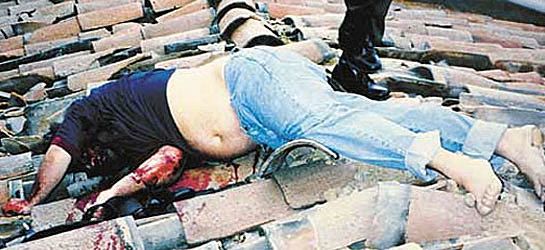Weekend Viewing Part One
I think I’m the Punch’s default sports guy. Not very good at it myself, and not exactly a font of knowledge, but I find it easy enough to be caught up in the thrill of a few select codes and have never really understood the antipathy some people hold for it, as if you can’t enjoy music and photography and sport without some sort of irreconcilable schizoid contradiction.
That said, I never usually give a fuck about sports movies, and the banal, macho trajectories most Hollywood ones tend to follow. But in the middle of Jeff and Michael Zimbalist’s devastatingly powerful documentary, The Two Escobars, the former coach of Colombia’s national soccer team reflects on decades of violence, corruption and terror and how it affected the fortunes of his players. “Football is not an island.” And then a lot of things crystallize - it suddenly hits home that the genre isn’t confined to lumbering feel-good pieces like Remembering The Titans or Invictus. This is a legitimate sports film. So is this. And The Two Escobars follows in those footsteps, a graphic, morally demanding film that locates a major historical sporting event in its wider social milieu as it inexorably draws the strands between its two doomed subjects.
The Escobars in question, though born in the same city, weren’t blood relatives: Andres was centre defence for Colombia’s team across two World Cups and a 26-match golden streak where his team was only defeated once at international level. In 1994, he sent his team packing from their initial pool with a disastrous own goal against the United States - the last photos, seen here, are of a haunted young man. A month later, he was dead - shot six times in his car by a gunman who chanted “GOAL!” over and over.
Pablo Escobar was a Colombian drug lord who climbed from unspeakable poverty to become one of, if not the most powerful criminals in world history. At his height, his cartel controlled the majority of the cocaine that entered Central and North America, and he made Forbes’ list of the top ten richest men in the world. Pressure from Reagan’s ‘war on drugs’ foreign policy saw Colombia reform its constitution to permit his extradition - after a spectacular, short-lived stint as an elected politician to avoid the new law’s application, Escobar unleashed a reign of terror (assassinations, bombings, bribery) that the doco presents without a flinch. The president of the time made a Faustian pact with other drug syndicates to turn their own ‘unorthodox’ methods to dragging Escobar out of hiding and killing him - it’s this increasingly nightmarish domestic situation from which the Colombian team emerge with an extraordinary rise and sudden, shattering fall.
The tie-in is that soccer, during this era, was a crucial ‘business’ for cartels. Cooking the books of football clubs was a glamorous and socially acceptable way for criminals to launder coke money into the legal economy - as one gangland survivor puts it, these teams and players were like ‘toy cars’ - vanities that actually secured safe cash the more you ran them. Where Escobar differed from his fellow criminals was his passion for the game at all levels. His patronage allowed his national team the best trainers, the best stadia, and the salaries to keep the best players, but he also earnestly built football grounds in his hometown for impoverished children, along with new apartments and homes for thousands of slum dwellers. This Escobar also met a violent end, and some of the most gruelling scenes come at the mass outpouring of grief at his public funeral - elderly peasants absolutely beside themselves with tearful rage. Pablo Escobar was a vile killer and a folk hero - and his empire of blood and addiction indisputably paved the way for Colombia’s ascent into football folklore.
Understandably, the film makes room for the difficult truth at the centre of this. The national team, over the course of six years, gave light and hope to one what was then of the most violent and unstable countries in the world. Yet the support to do so sprung from that same violence and instability, and some of the figures here are still reconciling that.
What the Zimbalists have done here is nothing short of remarkable, both in terms of the sort of primary footage they fished out and their success in getting the main dramatis personae to talk for the first time. Escobar’s widow and sister, his teammates, the then-President of Colombia (Cesar Gaviria) and even Pablo’s right-hand man (serving a life sentence in maximum security) are coaxed out to give their side of the story. The directors wisely eschew narration and its judgments. John Key-like, Gaviria slavishly followed his national team around the world, basking in their feel-good vibes while concentrating on improving national image rather than national conditions. And Pablo Escobar’s murderous associates are understandably keen to build up his populist mythos while glossing over their own atrocities. The film refrains from hitting these points home, while advancing just enough circumstantial evidence to suggest the rival cartels Colombia’s teetering oligarchy sponsored contributed to their World Cup loss, and Andres’ death.
If the pitch (City of God meets soccer meets The Wire) isn’t enough for some, then it comes back to the sport itself - seen here in both official and home video footage, it’s kinetic, electrifying, and beautiful. It’s only just aired in the US, but it’s a pity the NZFF didn’t keep out feelers to try and g(EDIT: I’m a huge fucking idiot who can’t read my NZFF guide properly. The Two Escobars is playing at the Auckland Film Fest on the 9th, 13th and 20th of July. See it.) it’s timely for its subject matter, and for giving us some perspective on how it feels to be a real sporting underdog. A Sunday morning well spent.

